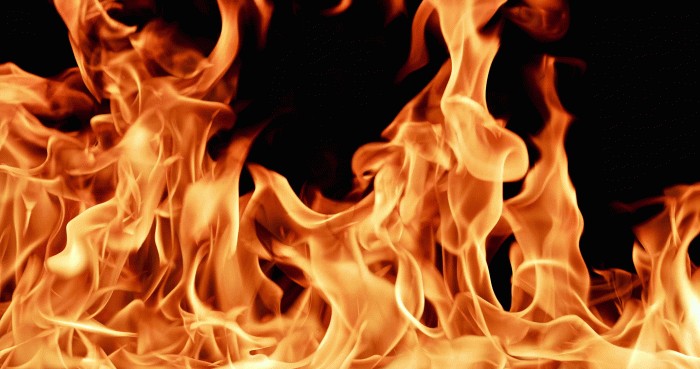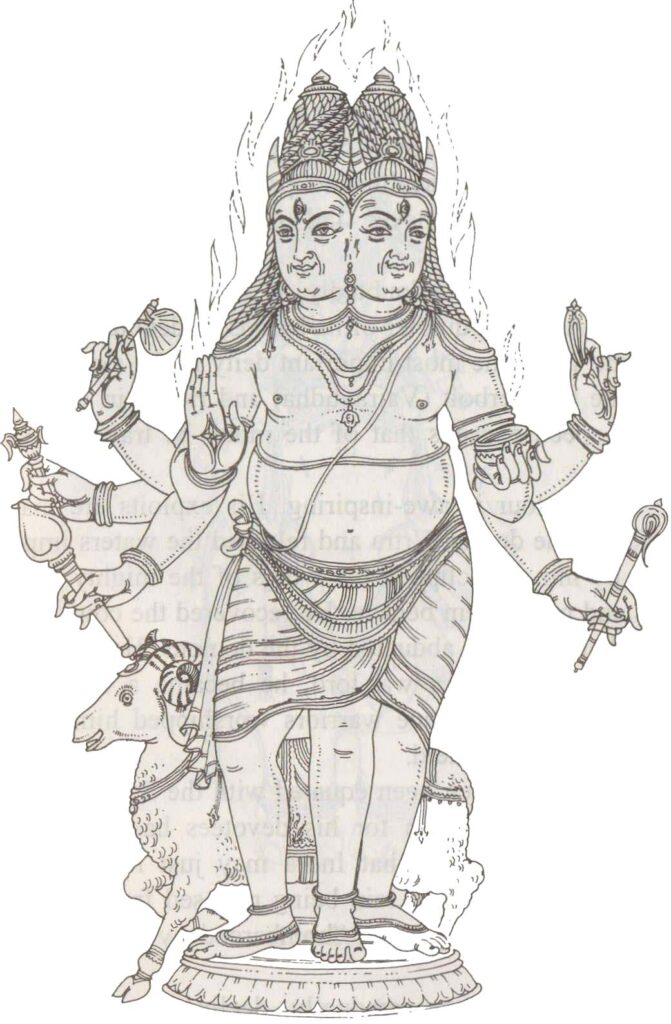
Agni is a significant deity in Hinduism and is often considered the god of fire and the messenger of the gods. In Hindu mythology, Agni is depicted as a powerful and purifying force. He is responsible for carrying offerings from humans to the gods through the ritual of fire sacrifices (yajnas).
Agni is often portrayed with two heads and multiple arms, symbolizing his dual nature and his ability to carry offerings and prayers to the gods and to transmit their blessings to humans. He is also associated with the sun and the hearth, making fire a central element in both religious rituals and daily life.
Agni’s importance goes beyond being a physical and metaphorical representation of fire. He is considered a link between the mortal and divine realms, bridging the gap between humans and the gods. His role in Hindu rituals and ceremonies is vital, as he is invoked to purify offerings and convey the worshiper’s prayers to the deities.
In addition to his role in Hinduism, Agni is also mentioned in other ancient Indian texts, such as the Vedas, where hymns are dedicated to him. He is a complex and multifaceted deity, symbolizing both the destructive and purifying aspects of fire, and his significance extends to various aspects of Hindu spirituality and culture.
Since the religion of the Rg-veda was mainly sacrificial, Agni, the god of fire, naturally got the pride of place. A maximum number of hymns are devoted to describing and praising Agni. He is often eulogised as the Supreme God, the creator, the sustainer, the all-pervading cosmic spirit. All other gods are his different manifestations. He manifests himself as fire (Agni) on this earth (Prthvi), as lightning or air (Indra or Vayu) in the sky (Antariksa) and as the sun (Surya) in the heavens (Dyuloka). He acts as a mediator between men and gods by carrying the offerings of men to gods. He is all-knowing and all-powerful. He is all-merciful too. Though an immortal, he lives among the mortals, in every house. He protects them by dispelling their difficulties and giving them whatever they pray for. Without him, the world can never sustain itself.
In later literature, Agni is described as the lord presiding over the southeast quarter.
The image of Agni in temples, represents him as an old man with a red body. He has two heads, a big belly and six eyes, seven arms in which he holds objects like the spoon, ladle, fan etc., seven tongues, four horns and three legs. He has braided hair, wears red garment as also the Yajnopavita (the sacred thread). He is attended on either side by his two consorts, Svaha and Svadha. The smoke is his banner and ram, his vehicle. Obviously, this is an anthropomorphic representation of the sacrificial fire.
Agni is a significant deity in Hinduism, and it is often considered the god of fire and the messenger of the gods. In Hindu mythology, Agni plays a central role in various rituals and ceremonies. Agni is regarded as a bridge between the human and divine worlds, as fire is a purifying element and a symbol of transformation.
Some key aspects and associations of Agni include:
- Sacrificial Fire: Agni is the fire used in Vedic rituals and sacrifices. It is through Agni that offerings are made to the gods, and the fire is seen as a conduit for prayers and offerings to reach the divine.
- Messenger of the Gods: Agni is often considered the intermediary between humans and the gods. He carries the prayers and offerings of the people to the heavens.
- Three Forms: Agni is said to have three forms – the terrestrial fire (in the form of flames on Earth), the atmospheric fire (lightning), and the celestial fire (the sun). These forms represent his omnipresence.
- Guardian of the Home: Agni is also considered the guardian of the household and is typically present in the form of a sacred fire (Agni-Deva) in Hindu homes. This home fire is continuously maintained and symbolizes the presence of Agni.
- Symbolism: Agni’s significance goes beyond the literal fire. He is often seen as a symbol of purity and the transformative power of fire, which is capable of both destruction and renewal.
Agni is one of the most revered deities in Hinduism and is mentioned in many Vedic hymns and scriptures. His importance in religious and spiritual contexts makes him a central figure in Hindu worship and rituals.
Agni is a prominent god in Hinduism, particularly as the god of fire and the messenger of the gods. In Hindu mythology, Agni is one of the most revered deities and plays a vital role in various religious rituals and ceremonies. Here are some key aspects of Agni as a god:
- God of Fire: Agni is considered the personification of fire in Hinduism. He represents the sacred and purifying aspects of fire and is an essential element in Vedic rituals and sacrifices.
- Messenger of the Gods: Agni is often depicted as the intermediary between humans and the divine realm. He carries offerings and prayers from the earthly realm to the gods and goddesses in heaven.
- Three Forms: Agni is believed to have three main forms – terrestrial fire (the fire on Earth), atmospheric fire (such as lightning), and celestial fire (the sun). These forms symbolize his omnipresence and connection to both the earthly and cosmic realms.
- Guardian of the Home: Agni is considered the protector of the household. Many Hindu families maintain a sacred fire, known as the “Agni-Deva,” in their homes, which symbolizes the presence of Agni and serves as a focus for daily rituals.
- Symbolism: Beyond his literal role as the god of fire, Agni symbolizes transformation, purity, and the power of fire to both destroy and renew. Fire is seen as a purifying force in Hinduism, and Agni embodies this concept.
Agni is venerated in Hinduism and is invoked in various prayers and mantras. His role in religious practices makes him a central figure in Hindu worship and rituals, and he is often depicted in Hindu iconography as a red or golden figure with two or more faces and multiple arms holding various objects, including a flaming torch or a ladle for offerings.

अग्नि आवाहन मंत्र
ॐ अग्नये स्वाहा। इदं अग्नये इदं न मम॥
अग्नि गायत्री मंत्र
ऊँ महाज्वालाय विद्महे अग्नि मध्याय धीमहि |
तन्नो: अग्नि प्रचोदयात ||
अर्थ : ओम। मैं महान ज्योति की ओर अपना ध्यान केंद्रित कर रहा हूं, ओह! अग्नि देवता मुझे बुद्धि प्रदान करें, हे अग्नि देव! अग्नि के तेजस्वी देव कृपा मेरे मन को अपने प्रकाश से रोशन करें।
हवन कुंड में अग्नि प्रज्वलित करने का मंत्र
१. ॐ वं वहि तुभ्यं नमः
२. ॐ भूपतये स्वाहा,
ॐ भुवनप,
ॐ भुवनपतये स्वाहा ।
ॐ भूतानां पतये स्वाहा ।।
